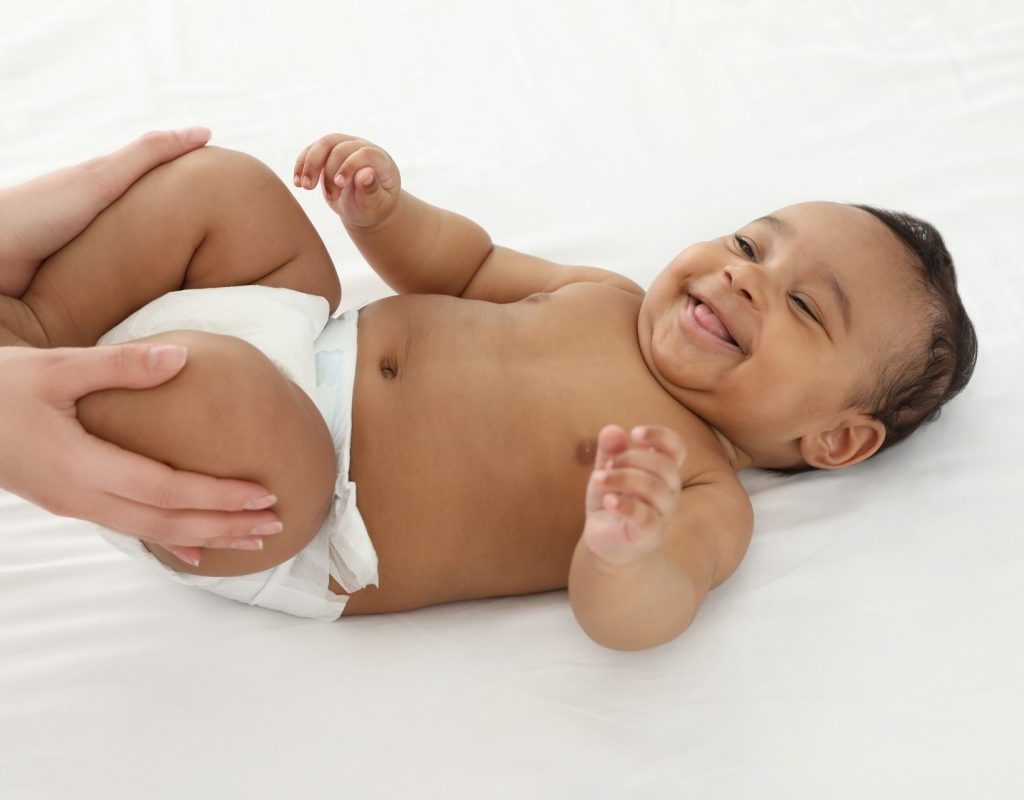Gazing at your beautiful baby’s face, you may wonder when she will start opening her eyes for longer periods of time. Or when he will offer his first smile. The hospital did not send you home with a manual. You may have tracked your pregnancy week-by-week and now you want to keep up with your little one’s childhood development stages.
Although your pediatrician will go over developmental milestones with you during your checkups, you may be curious about when you should expect your baby to start doing things. When will she start laughing? When will he lift his head or roll over?

Keep in mind these developmental milestones are guidelines, and they are not hard and fast rules. Each baby will develop at her own pace and some milestones may be met earlier while others may take longer. You may also notice that as your baby develops physically his vocal development may slow down.
Bring any concerns to your child’s pediatrician, but try not to panic if your baby is not growing exactly the way your weekly updates may dictate.
First three months of development
Month 1
Your newborn is going to sleep a lot during that first month! Most infants need 14 to 17 hours of sleep per day. Sometime during the first month, you should start to see your little one’s eyes a little more. Babies begin to visually focus on objects in the first few weeks.
As your newborn begins to focus more, you may notice she also starts watching her hands more and bringing them to her face. She may even begin putting her hands in her mouth. Whether she is sucking her hands, bottle, or binkie, your precious bundle is exercising strong sucking skills.
Many parts of your baby are still developing, like his hearing. Although your baby’s hearing is not fully formed yet, he recognizes your voice and other familiar voices from the womb. Your baby should be full of startle reflexes and will most likely respond to loud noises.
Tummy time is an important activity to develop your baby’s muscles and build strength. During that first month, your child may begin lifting her head while on her tummy. Her raises may be brief or may not be very high off the ground, but as she grows, her neck will get stronger.

Month 2
By the second month, your baby should be staying awake for longer and longer stretches. This gives you more time to interact. You may get your little one to smile with you. She may also begin copying sounds, especially vowel sounds. Try repeating a sound to your baby and watch her as she tries to shape her mouth and repeat the noise.
Because your baby is more alert, he is better able to visually explore his environment. You can foster this by placing toys near your baby for him to gaze at. Babies love high-contrast items — think black, red, and white. Infants can become overstimulated, so try to present objects one at a time.
This is also a great time to introduce different tactile toys that allow your little one to play with tactile exploration. You can introduce soft and bumpy items. A mirror can also add more smiles and giggles to playtime. At this stage, your baby will not recognize herself in the mirror, but she will enjoy seeing the baby looking back at her.
Physically, your infant should be lifting his head more often and for longer periods of time. You may also notice your child trying to roll, usually from belly to back. Your moving machine may be able to fully roll over, or that may come later.
Month 3
Along with smiling, during month three your baby will begin laughing. You may be able to coax these big, audible giggles by making silly faces or sounds at your infant. Try repeating vowel or consonant sounds to see if your baby can imitate them. She might even be able to repeat two or more sounds strung together.
Your baby is beginning to notice sounds more and may even start looking towards sound sources. Music and melodic sounds may elicit the biggest responses from your little one. Although cause-and-effect is still a developing concept, you can help encourage this by introducing toys that make noise after a button is pushed.
As you continue tummy time, your baby should be able to lift his head to around 90 degrees. He should be holding his head up for longer periods of time and with more control. If your baby was not rolling over in month two, he may be rolling over during month three.
The first few months with your baby can bring worries and you may find yourself searching for answers on what is and is not normal for your infant. Your baby changes and grows tremendously during the first three months. Each milestone met can be exciting.
Remember your baby is unique and she may develop at her own pace. Continue working with her to encourage her to reach each developmental phase. You can always speak with your pediatrician if you have any concerns.


